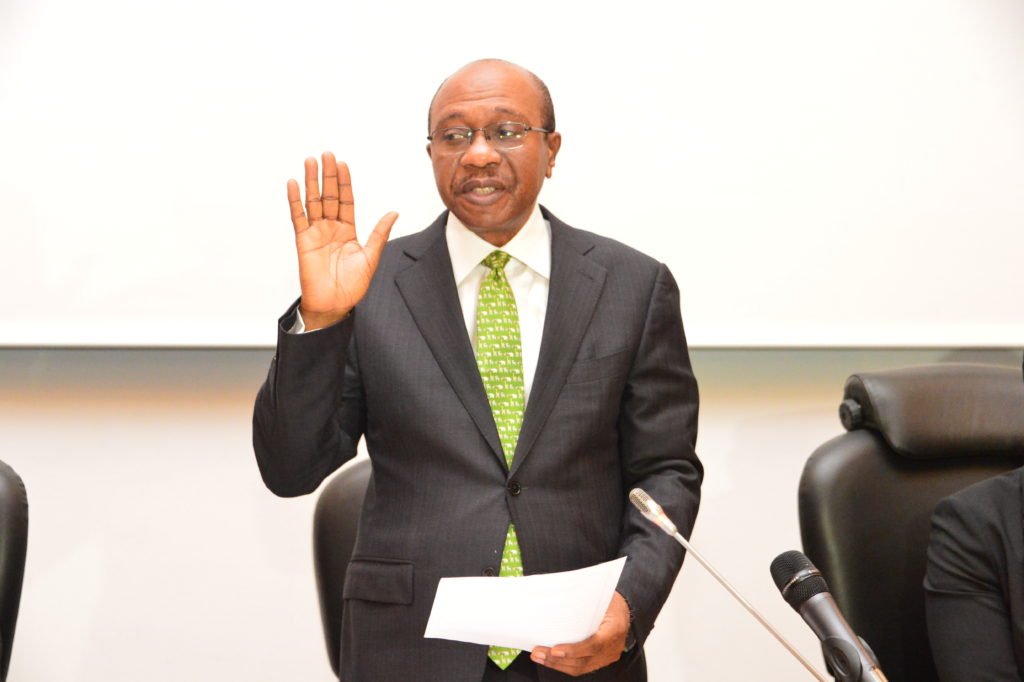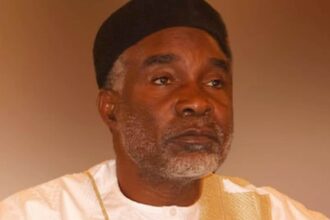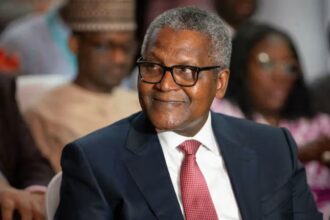...To get all news updates, Join our WhatsApp Group (Click Here)
Also Join our WhatsApp Channel (Click Here)
Nigeria’s public debt burden may hit N77tn if the National Assembly approves the request by the President Muhammadu Buhari, to restructure the Ways and Means Advances.
Thee Ways and Means Advances is a loan facility through which the Central Bank of Nigeria finances the shortfalls in the government’s budget.
This is as the Federal Government spent N5.24tn servicing debts in 2022.
The Director-General of the Debt Management Office, Patience Oniha disclosed this on Wednesday during the public presentation of the 2023 budget organized by the Minister of Finance, Budget and National Planning, Dr Zainab Ahmed.
She, however, noted that the debt would be N70tn without N5tn new borrowing and N2tn promissory notes.
Oniha said, “The DMO released the figure for the country’s debt stock as at September, you don’t expect it to be significantly different from December. Secondly, there are a lot of discussions on the Ways and Means. In addition to the significant costs saving in loans service we would get by securitizing it.
“There is an element of transparency in the sense that it is now reflected in the public debt stock. Once it is passed by the National Assembly, it means we will be seeing that figure included in the public debt. You will see a significant increase in public debt to N77tn.”
She said while the debt is growing because there is new borrowing, revenue is receiving significant importance.
“Like DMO always says, you can’t talk about debt without talking about revenue. We need the two to work together,” she added.
The FG’s huge appetite for borrowing under the current regime had worsened the debt position as the country’s debt stock rose to N44.06tn as of September last year.
The DMO and the government had come under attacks from experts and key stakeholders in the economy over the country’s rising debt levels.
Meanwhile, recently, the President, Major General Muhammadu Buhari (retd.), transmitted to the National Assembly, a request for approval of Ways and Means Advances restructuring to the tune of N23.7tn.
At the plenary on December 21, President of the Senate, Ahmad Lawan; and Speaker of the House of Representatives, Femi Gbajabiamila, read out Buhari’s request to members of the respective chambers.
In the request titled ‘Restructuring of Ways and Means Advances,’ the President wrote, “The Ways and Means Advances by the Central Bank of Nigeria to the Federal Government has been a funding option to the Federal Government to cater for short-term or emergency finance to fund delayed government expected cash receipt of fiscal deficit.
“The Ways and Means balances as of 19th December 2022, is N23,719,703,774,306.90. I have approved the securitisation of the Ways and Means balances along the following terms: amount, N23.7tn; tenure, 40 years; moratorium on principal repayment, 3 years; pricing interest rate, 9 per cent. Your concurrence and approval is sought to allow for the implementation of the same.”
However, the Senate rejected the request by the President to restructure the N23.7tn Ways and Means advances.
FG spends N5.24tn servicing debts in 2022
The finance minister said the Federal Government spent N5.24tn on debt service alone between January and November 2022, out of its N12.87tn total spending for the same period.
According to her, domestic debt gulped N2.51tn, foreign debt N1.08tn and interest on ways and means, N1.64tn.
In its December 2022 edition of the Nigeria Development Update, the World Bank projected that interest payments on the federal government’s borrowing from the CBN would gulp about 62 per cent of government revenue by 2027 despite the restructuring plan.
The report read in part, “Despite the restructuring of the Ways and Means stock in 2023, interest payments are projected to steadily increase by 2.4 percentage points of GDP between 2018 and 2027, and by 2027 interest payments will account for over 62 per cent of revenues.”
The PUNCH recently reported that the FG borrowed N6.31tn from the CBN through Ways and Means Advances in 10 months.
This pushed the government’s borrowing from the CBN from N17.46tn in December 2021 to N23.77tn in October 2022.
The N23.77tn owed the apex bank by the FG is not part of the country’s total public debt stock, which stood at N44.06tn in the third quarter of 2022, according to the Debt Management Office.
The public debt stock only includes the debts of the Federal Government, the 36 state governments, and the Federal Capital Territory.
The World Bank had, in November last year, warned the Nigerian government against financing deficits by borrowing from the CBN through the Ways and Means Advances, saying this put fiscal pressures on the country’s expenditures.
Despite warnings from experts and organisations, the Federal Government has kept borrowing from the CBN to fund budget deficits.
The Managing Director/Chief Executive Officer of Cowry Asset Management Limited, Mr Johnson Chukwu, recently said the central bank’s lending to the government was putting pressure on the exchange rate and the inflation rate, with “liquidity that has no productivity attached to it coming into the system.”
A Professor of Development Macroeconomics at the University of Lagos, Prof Olufemi Saibu, criticised the government for over-borrowing.
He said, “I think we are over-borrowing. We continue to rely on international benchmarks, which make us lazy in terms of revenue generation.”
Saibu urged the government to lessen its huge expenditure costs and channel money into more productive sectors of the economy.
He suggested, “With our current heavy infrastructure debt financing and the low productivity in the local economy, the government needs to find a way of reducing its expenditures. We need to redirect the government’s finances to areas that are productive and borrow less for consumption.”
FG to spend N3.36tn on fuel subsidy in 2023
The finance minister also said N3.36tn was earmarked for fuel subsidy in Nigeria’s 2023 budget.
During her presentation, Ahmed declared that fuel subsidy payments would remain up to mid-2023, based on the 18-month extension announced in early 2022.
This means fuel subsidy payments will be stopped in June 2023, after a new administration has been inaugurated following the outcome of the general elections in February, 2023.
She said, “The projected fiscal outcome in the 2023 Budget is based on the PMS subsidy reform scenario. In the 2023 Budget framework, it is assumed that petrol subsidy will remain up to mid-2023 based on the 18-month extension announced early 2022.
“In this regard, only N3.36tn has been provided for the PMS subsidy. There will be tighter enforcement of the performance management framework for Government-Owned Enterprises that will significantly increase operating surplus/dividend remittances in 2023.”
On the Federal Government’s revenue, the minister said as of November 2022, the sum of N6.50tn was generated.
This, she added, is about 87 per cent of the prorated target of N7.48tn.
She put the share of the Federal Government’s oil revenues at N586.71bn representing 35.7 per cent performance, while non-oil tax revenues totalled N2.09tn – a performance of 123.3 per cent
She stated that the Companies’ Income Tax and Value Added Tax collections were N1.08tn and N295.2bn, representing 158.6 per cent and 124.3 per cent of their respective targets.
Ahmed added that Customs’ collections comprising import duties, excise, fees, and special levies exceeded the target by N15.42bn.
On actual spending from the 2022 budget, she said as of November 30, it was N12.87tn
Of this amount, N5.24tn was for debt service; N3.94trn for personnel costs including pensions; statutory transfers while overhead and service-wide vote expenditures amounted to N8.1tn.
She also said the economy was no longer dependent on oil.
“We can no longer be termed a mono-economy. The Nigerian economy is now diversified,” she asserted.
Ahmed attributed the change to the revenue increase from non-oil sectors.
She added, “The non-oil sector is now generating more revenue for the nation while oil and gas, and mining sectors are pulling back the economy. The major non-oil contributors to the country’s revenue are agriculture and financial services.”
The finance minister further said that the president would sign the Finance Bill 2022 “in a couple of days”.
She attributed the delay to the president’s insistence that legal experts must scrutinise the Bill.
Missing stamp
The finance minister further said that the allegation of missing stamp duty revenue is currently being investigated by the National Assembly and security agencies.
Ahmed said if the allegation proves to be true and funds were recovered, it would help the government to finance its huge budget deficit.
A member of the House of Representatives, Muhammed Kazaure, had alleged the theft of N89.1tn stamp duty proceeds, accusing the CBN Governor, Godwin Emefiele, of being behind the missing money.
The minister said both the oil and mining sectors were pulling the national economy back. She also pointed to the costly fuel subsidy regime as a major drain on the economy.
The minister said the oil sector only contributed 22 per cent to the economy in 2022, a development she said was an indication that “the economy is truly, truly diversified.”
Ahmed said the non-oil sector, driven by communications and agriculture, has grown the economy significantly.
Ahmed also disclosed that the government recorded N18.14tn aggregate expenditure, including the supplementary budget in the 2022 budget implementation.
N6tn lost
The finance minister also said that the FG would be exiting some industries from the pioneer tax incentive list; even though she acknowledged that it might be an unpopular move that is likely to draw public criticisms.
She, however, added that infant industries would be included on the list to enjoy tax incentives to encourage their survival.
As regards tax waivers, she stated that a total of N6tn had been forgone between 2021 and to date under the tax waiver scheme, insisting that phasing out the tax waivers will help increase the government’s revenue.
The PUNCH recently reported that the Federal Government gave tax reliefs and concessions valued at N16.76tn to large companies between 2019 and 2021.
As of the end of 2021, 46 companies had benefited from various tax incentives and duty waiver schemes, while the requests of 186 companies were still pending.
The PUNCH also reported that at least 172 companies might not benefit from about N2.4tn tax waivers under the Pioneer Status Incentive and other tax exemptions as the FG moves to phase out tax waivers effective 2022.
You can get every of our news as soon as they drop on WhatsApp ...To get all news updates, Join our WhatsApp Group (Click Here)
Also Join our WhatsApp Channel (Click Here)












